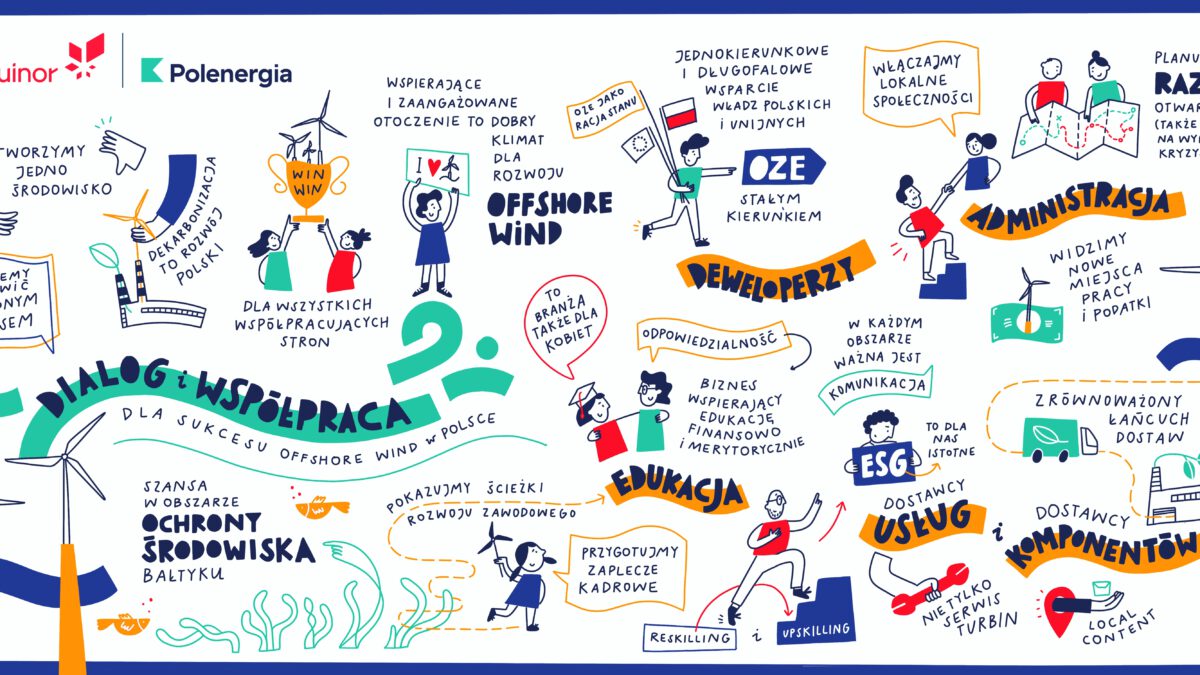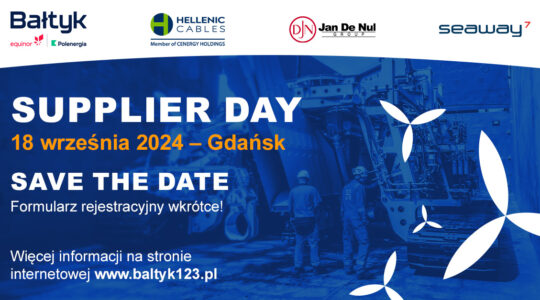Dialogue and cooperation are the key to the success of offshore wind in Poland

- We are all responsible for creating a favourable climate for the development of investments in the Polish zone of the Baltic Sea. And we can learn a lot from each other – this is one of the main conclusions of the round table discussion "Dialogue and cooperation for the success of offshore wind in Poland", which was organized jointly by Equinor and Polenergia on the second day of the Offshore Wind Poland 2023 conference.
The topic is not accidental, because since the beginning of the implementation of three flagship projects of the Baltic offshore wind farms with a total capacity of 3 GW, the Norwegian-Polish consortium has been undertaking a number of initiatives to raise awareness of both its own investments and the benefits resulting from them for the economy of the country, the Pomerania region or individual municipalities such as Łeba, Ustka or Słupsk.
In Łeba, there will be a service base servicing the Baltic Sea Farms, where approximately 100 specialists servicing wind farms will be employed. On the other hand, the onshore part of the transmission infrastructure of the projects will be located in Ustka and Słupsk.
Initiatives addressed to various groups of recipients, m.in. local communities, young people in primary and secondary schools looking for opportunities for new career prospects or entrepreneurs wishing to join the offshore wind supply chain, are implemented by investors as part of 5 Flagship Programmes.
Port cities are hoping for a revival
In order to get to know the local needs, investors also regularly meet with the inhabitants of towns located along the route of the wind farm connection infrastructure. In June 2023, they also opened the Baltic Offshore Wind Farm Information Centre in Łeba, which operates throughout the year.
- We are hostages of the economic monoculture that is tourism. That is why the construction of offshore wind farms gives new hopes for development - said Andrzej Strzechmiński, the mayor of Łeba, who has been closely observing the plans of offshore wind energy developers in Poland from the very beginning.
Representatives of the administration are counting on economic benefits for local communities, among which they mainly mention new jobs and supplementing municipal budgets with tax revenues. On the other hand, they are concerned about the impact of the new industry on existing sectors of the regional economy, mainly tourism and fisheries. In order to neutralize them, representatives of the administration point to the need for developers to undertake activities focused on training, the aim of which would be to retrain and re-specialize so as to give local specialists a chance to work on projects and in emerging service bases.
Necessary cooperation with the administration
On the other hand, the group of developers pointed to the expectations towards the regulatory environment regarding the streamlining and simplification of the process of obtaining permits, but also recognizing the development of RES as the Polish raison d'état. Offshore wind energy is built for decades to strengthen energy security. That is why its development should be consistently supported, regardless of the fluctuations in the macroeconomic situation," emphasized the representatives of developers, pointing to inflation, which is currently increasing both the costs of farm components and the costs of raising capital for investments. At the same time, the developers called for an open dialogue and building trust between various market participants.
The huge role of government administration is also recognized by the companies that make up the supply chain.
- Since offshore wind is to become an important flywheel of the Polish economy, government institutions and agencies should reward companies that want to join this industry. Without this support, some entrepreneurs will not be able to take advantage of this opportunity - noted Agnieszka Rodak, President of Rumia Invest Park. - We are talking here not only about investments in the corporate sector, but also about supporting existing training centres and creating new ones, as the industry will need qualified staff.
Regular dialogue also for service providers
Entrepreneurs supplying components for offshore wind farms are afraid of political instability, but also, like developers, of macroeconomic turmoil driving up prices. At the same time, Polish companies are aware of their weaker position in relation to foreign suppliers, which results in a low level of the so-called local content. -It is time to start a regular dialogue not only for component suppliers, but also for service providers - postulated the group representing the service provider sector. As indicated, service providers are not only service technicians of the main components, but also hoteliers, restaurateurs or even hairdressers. They would also like to know the project schedules and investors' expectations, the fulfilment of which would give them access to this market. - They want to know when and how to prepare for the expected increased demand for their services and be able to open credit lines in advance - it was argued.
Shared responsibility for educating staff
Although each of the five groups discussing during the round table spoke about the need to make an effort to educate future staff for the offshore wind sector, nowhere did this topic resonate as much as at the board devoted to education. There is a widespread expectation that business will also take responsibility for the proper preparation of specialists, and at the same time provide teachers with knowledge about the expected competences useful in newly created professions. "Support would be needed in the field of vocational and technical education, which is currently struggling with bad social perception. The involvement of business in practical vocational training as part of joint educational programs or the transfer of the equipment used for training purposes could be those areas where we could complement each other without entering into our competences and not leaving undeveloped issues – indicated the group related to education.
- Education leads to innovation. That is why the Gdańsk Entrepreneurship Foundation not only supports startups, but also gathers young people as part of the Youth Business Incubator. We invite business to take action so that today's youth can be employed in companies investing in offshore wind energy in the future - said Magdalena Wójtowicz, Vice-President of the Gdańsk Enterprise Foundation – Starter Incubator.
Wojciech Tyborowski, director at Invest in Pomerania, also declared support in the rebranding of specialists and in issues related to service ports, such as Łeba. - We want to work together so that the Pomeranian Voivodeship is ready for the challenges and opportunities brought by the development of offshore wind energy - he said.
An ecosystem of connected vessels
- We are at a decisive moment for our projects. We will soon complete the preparatory work on the Bałtyk II and Bałtyk III projects and start their construction. That's why we want to rethink the expectations of the groups we work with. The discussion shows that we are one ecosystem of interconnected vessels. That is why we should remain in constant dialogue - concluded Andrzej Popadiuk, Stakeholder Management Manager at Equinor, working for the Bałtyk II&III projects.
- We are at the beginning of a journey together that will last 30 years. It's hard to build relationships through online platforms. It is easier to do this by being present and educating the local community. That is why we appreciate the involvement of investors in the Bałtyk offshore wind farms in Łeba, as well as the support of young talents in our local community - added Tomasz Laskowicz from the University of Gdańsk, representing the Łebski Sailing Club, which has just finished its first season under Equinor sails.
Representatives of the offshore wind industry and representatives of various groups cooperating with the sector, present during the round table meeting, unanimously pointed to the need to continue the dialogue at further stages of the development of offshore wind farm projects in the Polish part of the Baltic Sea. - Communication is the key to success and, as this meeting shows, it is essential at every stage of the project implementation and in front of many stakeholder groups - summed up at the end of the round table discussion between Equinor and Polenergia.
Podobne wpisy

Supplier Day 2024 - save the date

Equinor and Polenergia award contract for offshore wind foundations for the Bałtyk 2 and 3 offshore wind farms

